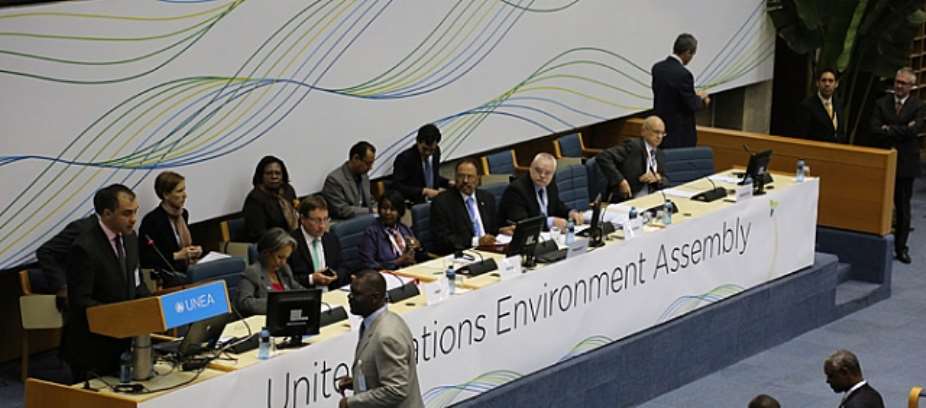Leaders from the world of business, finance and industry are participating in a symposium convened by the United Nations Environment Programme on mobilizing capital to facilitate the transition to greener economies.
This forms part of the First UN Environmental Assembly (UNEA) underway in Nairobi, Kenya to mark a historic milestone in UNEP's 43-year history.
UNEA is the newly constituted UN high-level platform for decision making on environment that is tasked to chart a new course in the way the international community addresses environmental sustainability challenges.
"The convening of the first UNEA session in Nairobi - home of UNEP and the often referred to environment capital of the world - represents a coming-of-age for the global environment community,' said Mr. Achim Steiner, UN Under-Secretary-General and Executive Director of the UN Environment Programme (UNEP).
The symposium offers a space for African civil society to articulate climate-friendly resolutions that protect the livelihood of vulnerable communities.
Secretary-General of the Pan African Climate Justice Alliance, Mithika Mwenda, has noted that the changing climate is the root cause of poverty.
'We depend on rain-fed agriculture and that woman in the village plants her crop, they geminate, but because of the erratic nature of rainfall as a result of climate change, that maize will not mature and those are the challenges that our people have been going through,' he observed.
He is worried the effects of climate change will affect the attainment of the Millennium Development Goals (MDGs) and the Sustainable Development Goals.
The challenge, according to Mithika, is to cap global emissions; enable people in developing countries have a future; get equitable, all inclusive and universally accepted Climate Change agreement in 2015.
'We cannot ask poor people and developing countries to bear the burden of the challenge,' he stated.
A green economy is an economy that promotes sustainable human wellbeing and social equity, whilst significantly reducing environmental risks.
The industrialized countries must therefore make financing available for poor countries to mitigate the effects of climate change, said he PACJA Secretary-General.
'There is no doubt that in order for poor countries and those in Africa particularly to address climate change adequately and sufficiently, they need to be facilitated with adequate finance from industrialized countries,' said Mithika.
The Green Climate Fund was set up by the UN as a mechanism to transfer money from the developed world to assist developing countries in adaptation and mitigation practices to counter climate change.
As much as $15 billion is expected to be raised by the end of 2014 to start financing projects and developing nations want industrialized countries to show how they intend to reach the $100 billion a year they pledged to deliver by 2020.
'The UN process must work for Africa and climate change should become an urgent political issue in which governments, international agencies must be challenged,' Mithika enjoined.
The first session of the UNEA under the theme: 'A Life of Dignity for All' will define the UNEP's ability to address the greatest environmental challenges facing the world today and in the future and provide inputs to the definition of the post-2015 development agenda - ensuring that environmental concerns are reflected and integrated into post-2015/Sustainable Development Goals framework.
The UN Under-Secretary-General says that despite some setbacks, notably in the climate change negotiations, there is broad consensus today that environmental protection requires addressing the relationship between humanity and nature.
"Now more than ever, it has become increasingly clear that the dichotomy between environmental sustainability and economic and social development should be overcome through the careful management of natural resources as the keystone of a prosperous and stable society,' said Mr. Steiner. 'In this new forum, UNEP and its partners will be able to provide governments and other policymakers with the science, policy options and platform, for international cooperation to more effectively address the environmental dimension of sustainable development."
Story by Kofi Adu Domfeh/ in Nairobi, Kenya





 Elisu By-election: "If you call yourself a man, boo Chairman Wontumi again" — Bo...
Elisu By-election: "If you call yourself a man, boo Chairman Wontumi again" — Bo...
 Fuel tanker driver escapes with his life after tanker goes up in flames near Suh...
Fuel tanker driver escapes with his life after tanker goes up in flames near Suh...
 Uniform change: ‘Blue and white are brighter colours’ — Kwasi Kwarteng explains ...
Uniform change: ‘Blue and white are brighter colours’ — Kwasi Kwarteng explains ...
 MoE not changing all public basic school uniforms but only newly built ones — Kw...
MoE not changing all public basic school uniforms but only newly built ones — Kw...
 We’re only painting new public basic schools blue and white – Dr. Adutwum clarif...
We’re only painting new public basic schools blue and white – Dr. Adutwum clarif...
 Bawumia has lost confidence in his own govt’s economic credentials – Beatrice An...
Bawumia has lost confidence in his own govt’s economic credentials – Beatrice An...
 I fought WW2 at age 16 – WO1 Hammond shares At Memoir Launch
I fought WW2 at age 16 – WO1 Hammond shares At Memoir Launch
 GRA-SML deal: Regardless of what benefits have been accrued, the contract was aw...
GRA-SML deal: Regardless of what benefits have been accrued, the contract was aw...
 April 26: Cedi sells at GHS13.75 to $1, GHS13.18 on BoG interbank
April 26: Cedi sells at GHS13.75 to $1, GHS13.18 on BoG interbank
 Champion, promote the interest of women if you become Vice President – Prof. Gya...
Champion, promote the interest of women if you become Vice President – Prof. Gya...
